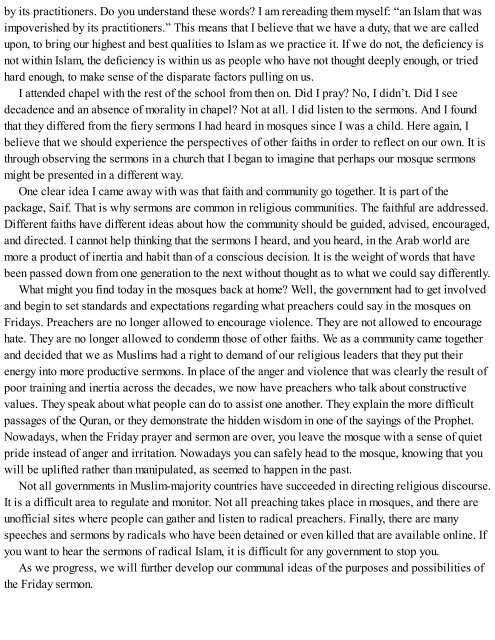1250119847
You also want an ePaper? Increase the reach of your titles
YUMPU automatically turns print PDFs into web optimized ePapers that Google loves.
y its practitioners. Do you understand these words? I am rereading them myself: “an Islam that was<br />
impoverished by its practitioners.” This means that I believe that we have a duty, that we are called<br />
upon, to bring our highest and best qualities to Islam as we practice it. If we do not, the deficiency is<br />
not within Islam, the deficiency is within us as people who have not thought deeply enough, or tried<br />
hard enough, to make sense of the disparate factors pulling on us.<br />
I attended chapel with the rest of the school from then on. Did I pray? No, I didn’t. Did I see<br />
decadence and an absence of morality in chapel? Not at all. I did listen to the sermons. And I found<br />
that they differed from the fiery sermons I had heard in mosques since I was a child. Here again, I<br />
believe that we should experience the perspectives of other faiths in order to reflect on our own. It is<br />
through observing the sermons in a church that I began to imagine that perhaps our mosque sermons<br />
might be presented in a different way.<br />
One clear idea I came away with was that faith and community go together. It is part of the<br />
package, Saif. That is why sermons are common in religious communities. The faithful are addressed.<br />
Different faiths have different ideas about how the community should be guided, advised, encouraged,<br />
and directed. I cannot help thinking that the sermons I heard, and you heard, in the Arab world are<br />
more a product of inertia and habit than of a conscious decision. It is the weight of words that have<br />
been passed down from one generation to the next without thought as to what we could say differently.<br />
What might you find today in the mosques back at home? Well, the government had to get involved<br />
and begin to set standards and expectations regarding what preachers could say in the mosques on<br />
Fridays. Preachers are no longer allowed to encourage violence. They are not allowed to encourage<br />
hate. They are no longer allowed to condemn those of other faiths. We as a community came together<br />
and decided that we as Muslims had a right to demand of our religious leaders that they put their<br />
energy into more productive sermons. In place of the anger and violence that was clearly the result of<br />
poor training and inertia across the decades, we now have preachers who talk about constructive<br />
values. They speak about what people can do to assist one another. They explain the more difficult<br />
passages of the Quran, or they demonstrate the hidden wisdom in one of the sayings of the Prophet.<br />
Nowadays, when the Friday prayer and sermon are over, you leave the mosque with a sense of quiet<br />
pride instead of anger and irritation. Nowadays you can safely head to the mosque, knowing that you<br />
will be uplifted rather than manipulated, as seemed to happen in the past.<br />
Not all governments in Muslim-majority countries have succeeded in directing religious discourse.<br />
It is a difficult area to regulate and monitor. Not all preaching takes place in mosques, and there are<br />
unofficial sites where people can gather and listen to radical preachers. Finally, there are many<br />
speeches and sermons by radicals who have been detained or even killed that are available online. If<br />
you want to hear the sermons of radical Islam, it is difficult for any government to stop you.<br />
As we progress, we will further develop our communal ideas of the purposes and possibilities of<br />
the Friday sermon.
















